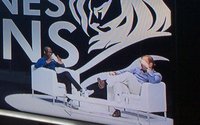
Culture is constantly evolving in every direction thanks to emerging
technology, artists, celebrities, and influencers. Troy Carter, founder, chairman, CEO, Atom Factory has a long history in predicting the next big thing having managed John Legend, Lady Gaga, Meghan
Trainor, and Charlie Puth.
During a conversation with Andrew Benett, global CEO, Havas Creative Group, Havas Worldwide at Cannes Lions, Carter discusses his view
of tomorrow's consumer that requires brands to rethink their social media strategies. Havas and Atom announced a new technology and brand consultancy venture called The Smashd Group at Cannes.
For the most part, brands stink at creating authentic relationships with
consumers, says Carter. The artist and the fan relationship is about authenticity and the voice of that particular artist, says Carter who adds that his group doesn't touch his artist's Instagram or
Twitter accounts. This one voice is critical in maintaining a real relationship between the artist and fan.
advertisement
advertisement
Brands, on the other hand, use teams to support their social media accounts.
There isn't a consistent voice which leads to brands sounding unauthentic and impersonal, he says. Adding to this noise, brands are inconsistent by chasing after the next popular trend. “Is
fashion, music, or sports hot this year?” he asks.
“Remember the phase where the objective for brands was to get as many Likes on Facebook?” asks Carter. No one really
knew what to do with this input. Now, "we are in the phase of data data data that no one knows what to do with," he says. He thinks brands need to prioritize how data can deliver the best experience
to "super-serve" the fan.
Feedback is one way to improve the relationship between consumers and brands. “Consumers can rate their experience in most brand interactions, but brands
knowing just me as a consumer in general is very rare,” says Carter. "Uber is the rare example of getting feedback on the customer experience," he says [Carter is an investor in Uber]. For the
first couple of years, few people knew that Uber drivers rate passengers just as passengers rate drivers, he says. "Now that everyone knows I am getting rated and this person is getting rated, we
treat each other better."